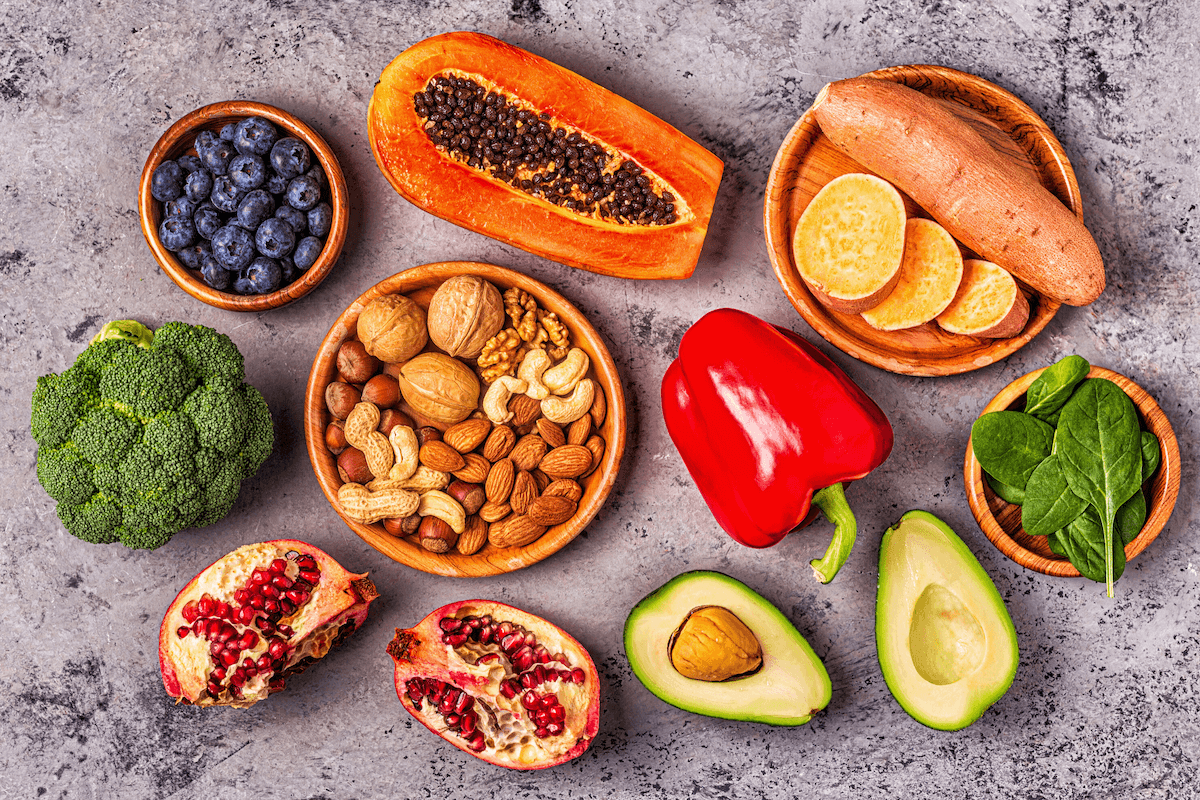Anti-Inflammatory Diet
Over the past month, I’ve been seeing a variety of patients who all seem to need an anti-inflammatory diet. So I figured I should write a blog post on it as well since there’s definitely something requiring anti-inflammatory in the air!
Who Can Benefit from an Anti-Inflammatory Diet?
Anyone who wants to prevent or reduce their current low-grade inflammation in order to prevent future health conditions.
More specifically, people with the following health conditions may find this diet beneficial for them:
- Allergies
- Arthritis
- Asthma
- Autoimmune diseases such as lupus or scleroderma
- Cancer
- Chronic pain
- Diabetes
- Endometriosis
- Heart disease
- Inflammatory bowel disease (IBD) including Crohn’s disease and ulcerative colitis
- Irritable bowel syndrome (IBS)
General Guidelines
In a nutshell, the anti-inflammatory diet focuses on whole foods that consist primarily of fruits, vegetables and legumes with healthy grains, lean meats and fish, healthy fats and the elimination of processed foods and sugar.
The following tips will make this diet easier for you:
- PLAN your meals ahead of time! Some patients even find taking a couple of hours on a Sunday afternoon/evening to meal prep super useful. You’d be surprised at how much this makes the remainder of your week a breeze!
- Do NOT eat any one food more than 3 times a week
- Experiment with different foods that you’d never try before
- Experiment with different recipes and save the ones that you LOVE so that you’ll have a whole list favourite recipes to choose from in the future. You’re basically curating your very own recipe book!
- And most importantly, take the time to ENJOY your food.
Anti-Inflammatory Diet Details
Fruits
If you find fruits difficult to digest, try baked fruits. Sometimes just a bit of cinnamon on it will make it dessert-like!
Fruits OK to Eat
Apples, apricots, bananas, blackberries, blueberries, cantaloupe, cherries, cranberries, figs, grapes, kiwis, mangoes, melons, papayas, peaches, pears, pineapples, plums, pomegranate, prunes, raspberries, rhubarb and strawberries
Fruits to Avoid
Citrus fruits
Vegetables
Focus on vegetables that contain lower amounts of carbohydrates.
If you have digestive issues, consider steaming your vegetables instead of eating them raw so that it is easier to digest.
Vegetables OK to Eat
Artichoke, asparagus, bean sprouts, beets, beet greens, bok choy, broccoli, Brussels sprouts, red cabbage, green cabbage, carrots, cauliflower, celery, chives, collards, cucumber, dandelion greens, eggplant, endive, mixed greens, kale, kohlrabi, leeks, green lettuce, red lettuce, romaine lettuce, mustard greens, onions, parsley, parsnips, green peas, sweet peppers, pumpkin, radishes, rutabagas, spinach, squash, string beans, sweet potatoes, Swiss chard, turnips, watercress, yam and zucchini
Vegetables to Avoid
Potatoes and tomatoes
Legumes
Soak the legumes overnight and cook them the next day.
Legumes OK to Eat
Aduki beans, black beans, garbanzo beans, kidney beans, mung beans, pinto beans, lentils, split peas and fermented soy (such as miso and tempeh)
Legumes to Avoid
Tofu may cause reactions in some people, so experiment with it with and without to see what you tolerate better
Grains
Grains OK to Eat
Amaranth, buckwheat, millet, oatmeal, quinoa, basmati rice, brown rice, sorghum, teff and wild rice.
Rice crackers and wasa crackers are also OK.
Grains to Avoid
Any product containing gluten including breads, cereals, white flour and pastas.
The following grains contain gluten: barley, rye and wheat and ALL of their derivatives, including bulgar, durum, farro, kamut, oats (* unless specifically labelled gluten-free), semolina and spelt.
Meat
Meats OK to Eat
Chicken, turkey, elk, lam, wild game and venison.
Meats to Avoid
Beef and pork
Dairy
Dairy OK to Eat
Small amounts of organic butter or eggs
Dairy to Avoid
Other dairy products including cheese, commercial eggs and animal milk
Seafood
Seafood OK to Eat
Cod, summer flounder, haddock, halibut, mackerel, salmon, sardines, trout and tuna.
Seafood to Avoid
Shellfish including clams, crab, lobster and shrimp
Oils
Oils OK to Eat
For cooking: avocado oil, coconut oil or grapeseed oil
For salads: olive oil, flaxseed oil or hempseed oil
Oils to Avoid
Hydrogenated oils
Nuts & Seeds
Nuts & Seeds OK to Eat
Most are acceptable including the nut butters
Nuts & Seeds to Avoid
Peanuts and peanut butter
Spices
Spices OK to Eat
You’re welcome to add ANY spice to enhance the flavour of your food!
Sweeteners
Sweeteners OK to Eat
All in moderation! Raw honey, stevia, pure maple syrupe and brown rice syrup
Sweeteners to Avoid
All sugars and all artificial sweeteners
Beverages
Beverages OK to Eat
A small amount of almond milk, cashew milk, hazelnut milk, oat milk, rice milk and soy milk is OK
Herbal teas are a good substitute for coffee and juice
Beverages to Avoid
Alcohol, coffee, juice, pop and caffeinated teas
Miscellaneous Foods
Miscellaneous Foods to Avoid
Corn products, fried foods, processed foods
** Please note that this is NOT medical advice and that you should talk to your healthcare provider before taking beginning a strict diet
If you’d like to work together and discuss if the anti-inflammatory diet would be beneficial for you, CONTACT ME HERE to set up a complimentary 15 min discovery call/meeting to get started.
What’s a discovery call/meeting? It’s where we get to know each other better to ensure that I’m the right practitioner for you and that you have the opportunity to ask your questions about Naturopathic Medicine before we move forward with an initial Naturopathic consultation.
Here are a few more posts that you might also be interested in:
- Diet and Meal Plans
- Sugar Goes By Other Aliases
- My Endo Story
- Sugar; Is It As Bad As Everyone Says?
- Endometriosis and Estrogen Dominance
#drmoirakwokND #cleaneating #healthyeating #nutrition #yummy #youarewhatyoueat #healthybalance #bodyisatemple









